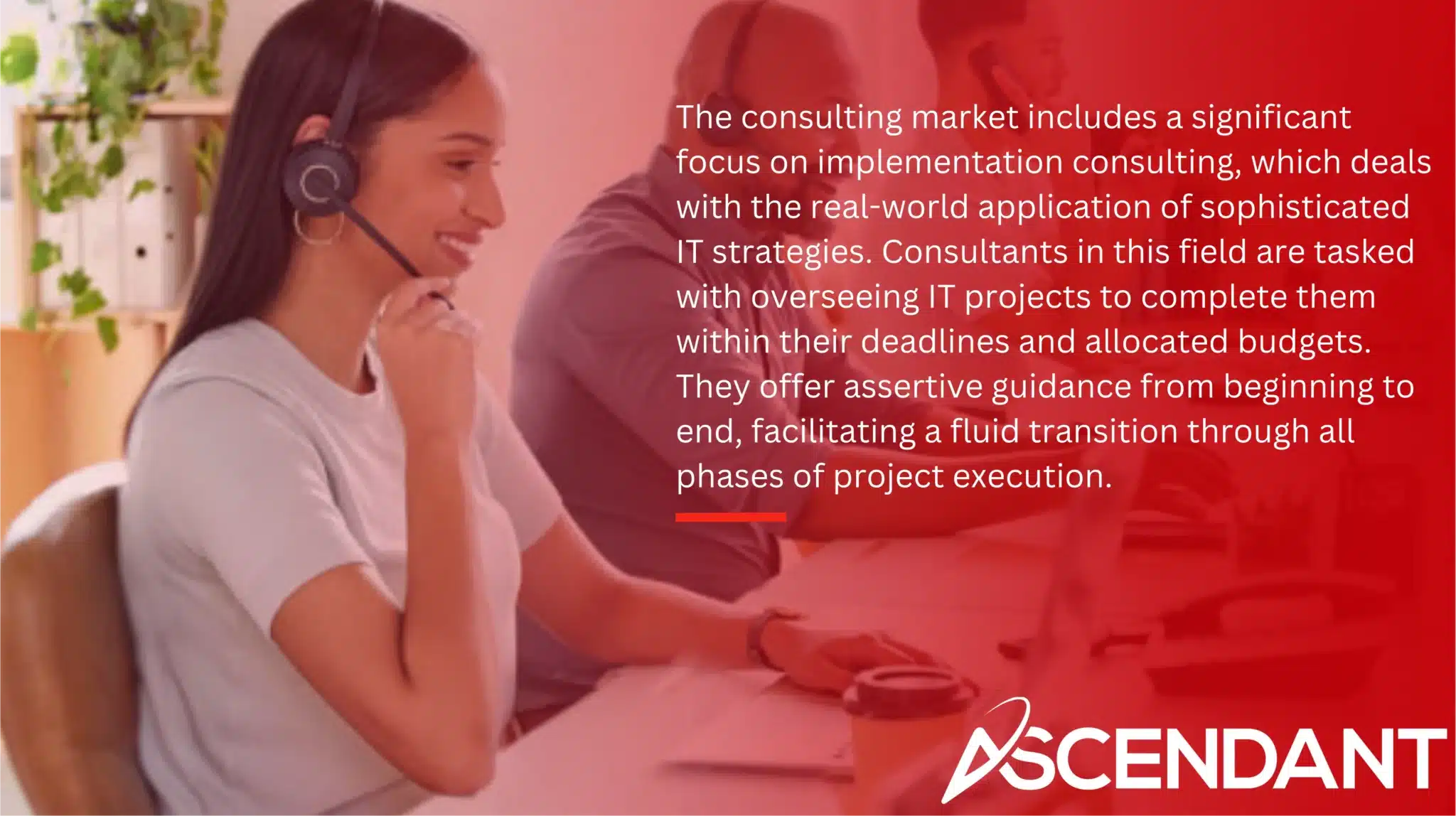Types of IT consulting services address various business needs, from cybersecurity to data analytics. This article outlines the key consulting areas and how they can enhance your operations.
Key Takeaways
- Cybersecurity consulting is essential for assessing vulnerabilities and enhancing protection against cyber threats through tailored strategies and regular employee training.
- IT strategy consulting focuses on aligning technology with business goals to drive efficiency and support digital transformation, requiring consultants to possess industry expertise and strong communication skills.
- Emerging technologies consulting enables businesses to leverage innovations like AI and blockchain to stay competitive and drive growth, emphasizing the need for continuous learning and adaptability in the consulting field.
Cybersecurity Consulting Services
In the current landscape, where cyber threats are escalating in complexity, consulting services focusing on cybersecurity have become essential. These offerings commence with an exhaustive assessment of cybersecurity to pinpoint potential weaknesses and hazards within a company’s infrastructure and operational procedures. By mapping out the risk profile, consultants can customize their advice for solid defenses against imminent dangers.
Penetration testing stands as a fundamental aspect of cybersecurity consulting practices. This method involves crafting simulated cyberattacks to unearth flaws within security frameworks. Consultants adopt an integrative stance that weighs both technological assets and personnel factors when forging potent defense tactics. Continuous evaluations ensure that businesses remain one step ahead by adapting their protective protocols in line with changing threat landscapes.
Educating employees is vital in the realm of cybersecurity consulting services. Training staff members to identify and tackle security incidents effectively diminishes vulnerability risks substantially. Cybersecurity consultants deliver specialized guidance aligned with unique enterprise requirements, thereby establishing a thorough bulwark versus digital threats.
IT Strategy Consulting
Strategy consulting in IT revolves around ensuring that technology initiatives are in harmony with an organization’s business aspirations. Consultants specializing in strategy provide guidance to firms looking to weave their technological strategies into the fabric of their broader corporate ambitions. They focus on refining business processes for heightened efficiency and cost savings, honing in on overarching concerns and directing the execution of plans designed for achieving enduring company goals.
As organizations press forward to derive strategic advantages from tech investments, the significance of IT strategy consultants grows ever more evident. These professionals play a pivotal role amid digital transformations by offering their specialized knowledge to smooth over the intricacies involved with adopting novel tech solutions. The current landscape also sees strategy consultants delving into industry-specific services, crafting bespoke strategies that resonate within particular markets.
Selecting an adept IT strategy consultant involves evaluating their sector-related experience as well as their communication prowess. Competent strategists support corporations not only sidestep inefficiencies but also skirt financial excesses during periods marked by digital evolution. Leveraging a profound insight into both market trends and organizational needs is how these experts empower businesses toward triumphant outcomes.
IT Implementation Consulting

The consulting market includes a significant focus on implementation consulting, which deals with the real-world application of sophisticated IT strategies. Consultants in this field are tasked with overseeing IT projects to complete them within their deadlines and allocated budgets. They offer assertive guidance from beginning to end, facilitating a fluid transition through all phases of project execution.
Inherent to the role of these consultants is the harmonization of cutting-edge technologies with pre-existing systems within an organization. This not only allows for uninterrupted business operations, but also permits ongoing oversight over how well an IT system functions. Effective communication capabilities are indispensable for these professionals as they create meticulous documentation and engage in teamwork alongside an organization’s internal tech personnel.
Implementation consulting transcends mere technical integration. It encompasses guiding businesses through transformational change at every level. By working intimately with clients, consultants gain insights into specific requirements that help customize solutions aptly suited for those needs. Through this intimate collaboration, new technologies become fully embedded within organizational workflows—optimizing their utility and influence across various processes.
IT Architecture Consulting
Consulting in IT architecture is centered on the creation of a clear and logical framework for an organization’s information technology infrastructure. It includes evaluating current IT systems to enhance their alignment with critical business processes. Consultants work to sustain or boost the efficacy of older legacy systems, making certain they continue to be both useful and high-performing.
To leverage the full potential of an organization’s IT infrastructure across different divisions, consultants craft a strategic plan. By refining how IT architectures are designed and rolled out, these experts bolster operational workflows within businesses and promote greater organizational efficiency.
ERP Systems Consulting
Consulting in the realm of enterprise resource planning primarily aids businesses in both choosing and deploying ERP systems, as well as in their proficient management. Such systems enhance operational efficiency and bolster decision-making capabilities by integrating disparate business processes into a unified framework. Consultants independent of specific ERP vendors deliver impartial evaluations, which are essential to informed decision-making when picking out an appropriate system.
To this, IT consultants also play a pivotal role by offering training to users on the new technologies associated with these systems. This all-encompassing strategy guarantees that ERP systems are seamlessly woven into the fabric of the organization’s operations, thereby optimizing benefits and propelling business achievement forward.
Data Analytics Consulting
Strategy consultants specializing in data analytics guide enterprises through the collection, interpretation, and examination of their data to produce valuable strategic insights. They identify patterns and trends that shape an organization’s strategy-making and choices. Ensuring that data is centralized and cleansed is fundamental to this approach as it confirms the dependability of information utilized for analytical purposes.
By crafting dashboards and reports which visualize critical insights drawn from data, consultants make it easier for businesses to comprehend these findings so they can take decisive action more effectively. The evolving model of ‘analytics as a service’ offers companies on-demand access to specialized analytics knowledge while alleviating the need for dedicated internal resources by providing tailored yet scalable solutions designed around unique business requirements.
Advancements in generative AI have revolutionized how quickly key metrics specific to organizational demands are accessed, enhancing real-time analysis capabilities. Consultants adept in IT strategy utilize robust data management platforms enabling companies to base their strategic decisions on precise insights—actions that ultimately lead to greater accomplishments within the competitive landscape of business.
Cloud Computing Consulting
In the domain of business, consulting services focused on cloud computing are vital for companies planning to transfer their systems to a cloud-based infrastructure. To ensure an efficient transition that resonates with company objectives, it is imperative to set clear goals ahead of time. Selecting an appropriate cloud service provider requires scrutiny over aspects such as security measures, cost structure options, and potential for growth in order to meet the specific needs of a business.
It is essential for businesses to conduct a comprehensive evaluation of current infrastructures when considering what components can be effectively moved into the cloud environment. Consulting expertise related specifically to cloud architectures plays a key role in adapting old systems into modernized, resilient applications capable of leveraging the scalability provided by the cloud. Imparting knowledge about new tools associated with these platforms is critical in facilitating seamless adoption among team members.
The strategic involvement of consultants is paramount when it comes to ensuring effective use and managing resources within virtualized spaces so as not overspend or underutilize capabilities offered through these services thus achieving economic efficiency. The proper design implementation maintainable architecture magnifies capacities organizational integrations automating routines Businesses harness transformative power innovative tactics thanks versatility reliability enabled advanced technologies emerging ecosystem hosting storage computation solutions.
IT Security Consulting
IT security consulting encompasses the evaluation of existing security protocols and pinpointing potential risks. The process is instrumental in establishing robust defensive measures that safeguard critical data. Conducting a comprehensive security audit entails selecting appropriate benchmarks, evaluating staff training proficiency, and scrutinizing network behavior to map out strategies for rectifying weaknesses and enhancing protective barriers.
The outcome of a rigorous security audit is typically encapsulated in an exhaustive report detailing observations, susceptibilities within systems, along with proposed amendments for bolstering defense mechanisms. This includes performing penetration tests to discover explicit system frailties deliberately. It’s recommended to undertake these assessments more frequently than on an annual basis so as to proactively tackle any emerging cyber threats.
Through audits, systemic imperfections can be discovered not just in physical hardware but also across software applications, networking infrastructure, and even employee management of sensitive material—these gaps once identified are patched up ensuring fortified defence against imminent dangers. Thereby underscoring IT Security consulting as indispensable to sustain the integrity of business operations.
Software Management Consulting
Management consulting in software management encompasses guidance on choosing, implementing, and overseeing various software systems. This consultancy is vital for boosting operational effectiveness by optimizing business processes with bespoke software applications. A primary function of this service involves the analysis of current software infrastructure to pinpoint opportunities for upgrades and enhancements.
Consultants specializing in software management offer professional advice that aids businesses in selecting appropriate technological solutions and successfully integrating them into their existing workflows. The implementation of such tailored recommendations can result in enhanced productivity and more efficient operations. Financial consultants are integral to refining the distribution of resources within an organization’s framework through this process.
Emerging Technologies Consulting
Consulting services are becoming increasingly vital as businesses seek to harness the transformative power of emerging technologies such as artificial intelligence, augmented reality, and blockchain. These innovations offer organizations a competitive advantage when strategically integrated into their operations. Strategy consultants specializing in IT deliver essential guidance and advanced technology solutions that propel product development and service innovation.
As AI and blockchain continue to advance at a breakneck pace, demand for consultants adept in these cutting-edge fields is surging. Businesses rely on the expertise of strategy consultants proficient in emerging technologies to demystify complex applications and implement them effectively—thereby securing their position at the forefront of industry progression while fostering business growth.
By incorporating state-of-the-art technological advancements into their processes, companies can profoundly transform how they operate. This transformation facilitated by consulting services not only enhances efficiency but also opens up new pathways to remarkable achievements within the business sector.
The Pros and Cons of IT Consulting Careers
Embarking on a career in IT consulting brings with it a variety of projects, each contributing to professional growth and the opportunity for perpetual knowledge enhancement. For consultants ready to strategically transition between jobs, there is potential for greater financial stability. Nevertheless, one might find regulating work hours demanding as they may exceed standard office schedules.
In the realm of consulting, job security can fluctuate during times of economic strife. It’s vital for IT consultants to hone their communication skills, especially when tasked with conveying less-than-favorable updates to clientele.
Despite any hurdles faced within this field, pursuing a profession in IT consulting remains immensely rewarding. It presents distinctive opportunities for both personal and professional advancement that are unparalleled in many other industries.
Future Trends in IT Consulting
It’s crucial for IT consultants to stay abreast of evolving technology trends to offer innovative solutions that serve clients well. The IT consulting field is being transformed by the emergence of technologies like IoT, big data analytics, 5G, blockchain, AI, and AR. For future success in this dynamic environment, consultants must cultivate a mindset geared towards continuous learning and master emerging technological skills while enhancing their collaborative abilities.
There’s an increasing pressure on consulting firms to revamp their recruitment strategies with the aim of attracting a diverse pool of candidates and fostering workplaces where inclusiveness thrives. As corporate focus shifts toward sustainability issues. Projections indicate that demand for Environmental Social Governance (ESG) related consultancy could potentially double by 2027.
As organizations navigate through transforming workspaces and the adoption of hybrid work models continues unabatedly. They are turning more than ever before towards information technology consulting for expert advice on best practices. This reliance is pushing innovation forward within corporate strategies across the consulting sector thereby driving growth among technology consulting entities, such moves reflect ongoing industry developments which underscore both the current significance as well as promising potential within IT Consulting careers ahead.
 Summary
Summary
To summarize, the array of IT consulting services available is instrumental in enhancing business productivity. These services encompass a variety of areas such as cybersecurity, strategic IT planning, cloud solutions and keeping pace with emerging technologies. Utilizing these distinct offerings can revolutionize an enterprise by optimizing operational efficiencies, fortifying security measures and maintaining technological competitiveness through the specialized knowledge of seasoned IT consultants.
Looking ahead, it’s anticipated that the demand for IT consulting will continue to rise due to relentless technological innovations and businesses’ imperative need to adapt to novel tech trends. By embracing the expertise provided by consulting in information technology, companies are poised not only for immediate improvement but also for long-term prosperity and market leadership.
Frequently Asked Questions
What is the main role of cybersecurity consulting services?
Cybersecurity consulting services primarily assess vulnerabilities and conduct penetration tests, offering tailored recommendations to enhance the protection of an organization’s systems and processes.
Engaging these services helps organizations strengthen their security posture effectively.
How does IT strategy consulting benefit a business?
IT strategy consulting benefits a business by ensuring that technology aligns with organizational goals, improving operational efficiency, and mitigating risks related to budget overruns during digital transformations.
This strategic alignment ultimately drives better performance and growth.
What is the significance of ERP systems consulting?
ERP systems consulting is crucial for enhancing organizational efficiency and decision-making by integrating business processes into a unified system. It also provides unbiased evaluations and necessary user training, ensuring that teams can leverage the system effectively.
Why is data analytics consulting important for businesses?
Data analytics consulting is crucial for businesses as it enables them to effectively gather and analyze data, leading to strategic insights and informed decision-making. This process helps identify trends and visualize information, ultimately driving business growth.
What are the future trends in IT consulting?
In the realm of IT consulting, forthcoming developments will center on embracing cutting-edge technologies like IoT, AI, and blockchain. This progression necessitates that consultants commit to a regimen of continuous learning and bolster their abilities to collaborate effectively.
It is imperative for those involved in IT consulting to keep abreast with these technological advancements as they are vital for thriving in the changing industry landscape.

